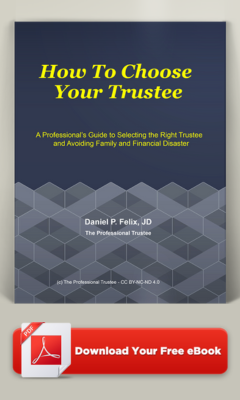The impact of a trustee’s refusal to share information with a beneficiary.
There’s a recurring question of how much the trustee should disclose to the beneficiary.
This problem is bound by legal minimums on one side. On the other side, we have questions of prudence, diplomacy and privacy, including the trustee’s assessment of the beneficiary’s ability to productively hear, process and act on the information.
In some cases, such as a charity receiving a specific bequest, it’s difficult to see how the rest of the trust details are any of the charity’s business. But let’s focus on family members and others the trust creator holds with personal affection.
The grantor may have even imposed some limitation on what the trustee may tell the beneficiaries and when.
Which raises the question of the impact on the beneficiaries. How the information — or lack of it— will positively or negatively affect them.
And, assuming one of the purposes of the trust is to benefit the beneficiary, then another consideration is: what approach best serves the beneficiary?
For me, this complex equation is well expressed in the declarative koan: A beneficiary should benefit from full and prudent disclosure of the trust’s administration. This declaration is from my Beneficiary’s Bill of Rights.
So, a colleague called to discuss a situation. His client, a beneficiary of a trust established by his parents, was told he has the option under that trust to become a co-trustee. Yet, the corporate trustee has refused to supply a copy of the trust, claiming that the beneficiary is not entitled to the information.
What should we make of the trustee’s refusal?
One facet of impact is practicality, which asks the question: how can the beneficiary make an intelligent choice without having access to the relevant information? We’d like to know what the job of co-trustee entails and to what extent is the co-trustee system of governance clear, complete and doable.
As a legal matter, we’d like to know also what the trust and also the law provides as to non-disclosure. Where are the lines of trustee loyalty drawn? In Illinois the law was recently updated to require the trustee to provide a copy of the trust document to certain beneficiaries.
As a psycho-spiritual emotional matter, how does this child hold this challenging non-disclosure, especially if it was instituted by his parents? “My parents have invited me to step into a role with likely responsibility and possible benefit, but refuse to give me any information.” Where does the beneficiary go from there?
As to the long-term relationship of all the parties, how does this non-disclosure build trust or generativity? Whatever the beneficiary decides, where do the relationships go from here?
The answers to these and other key questions may vary. Whatever those answers, isn’t the conclusion the same? There may be a successful trust only with an appropriate consideration of the beneficiary’s reasonable need to know.
Photo by Scott Graham on Unsplash© 2016-2023 Daniel P. Felix, all rights reserved


